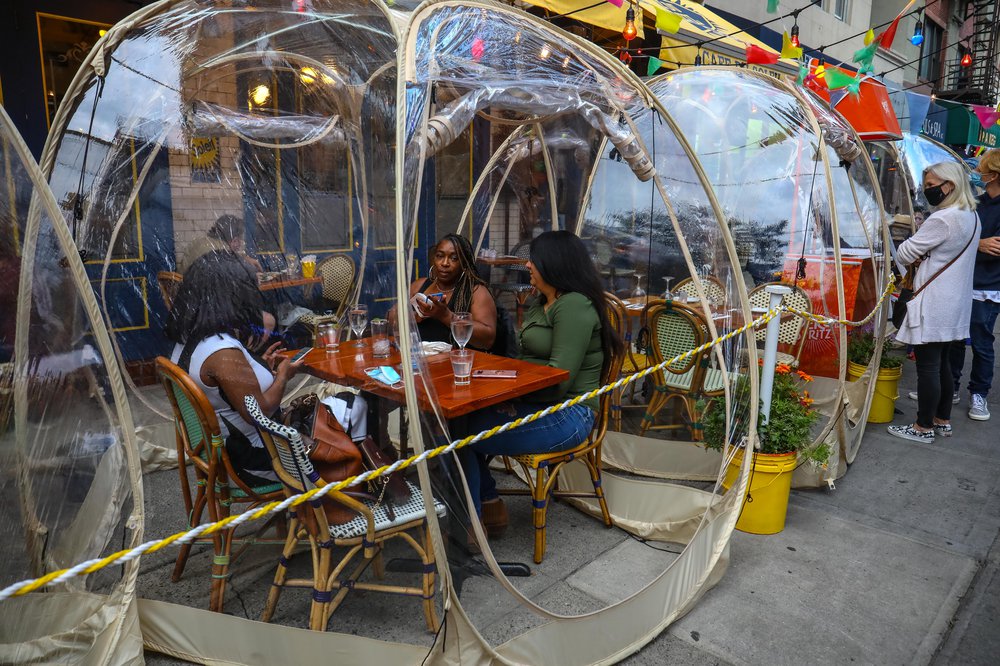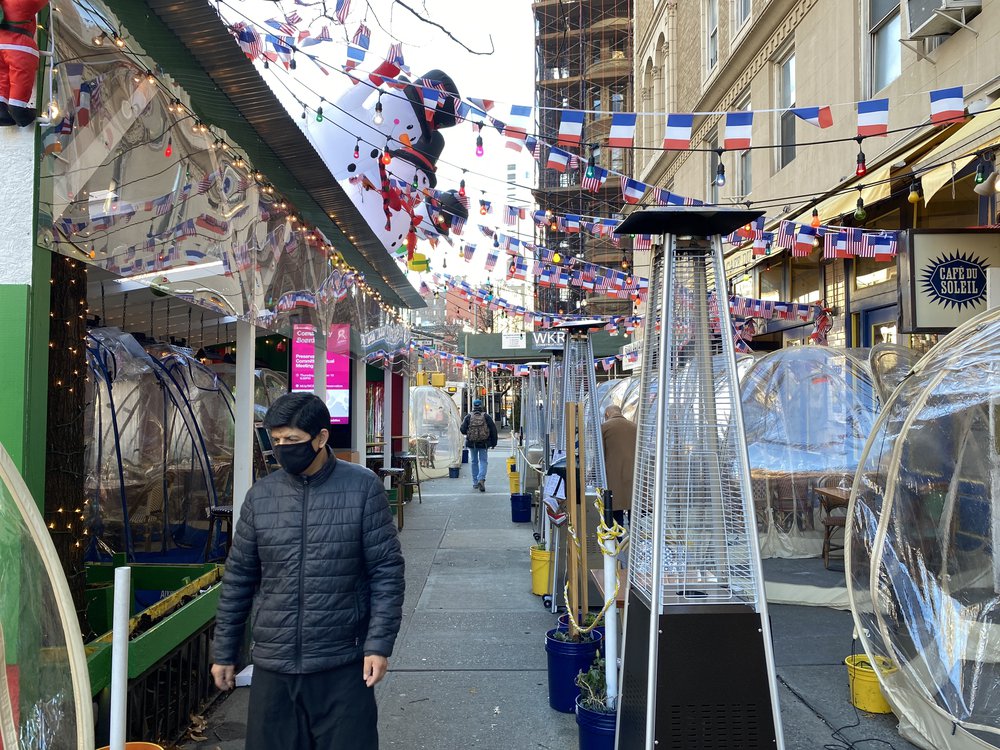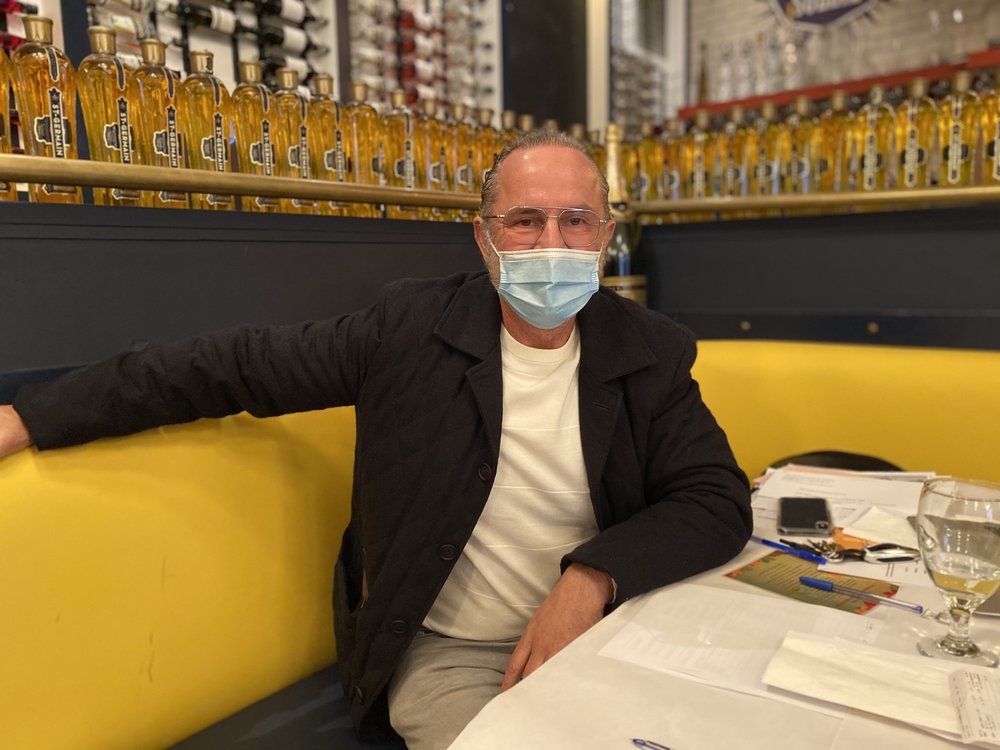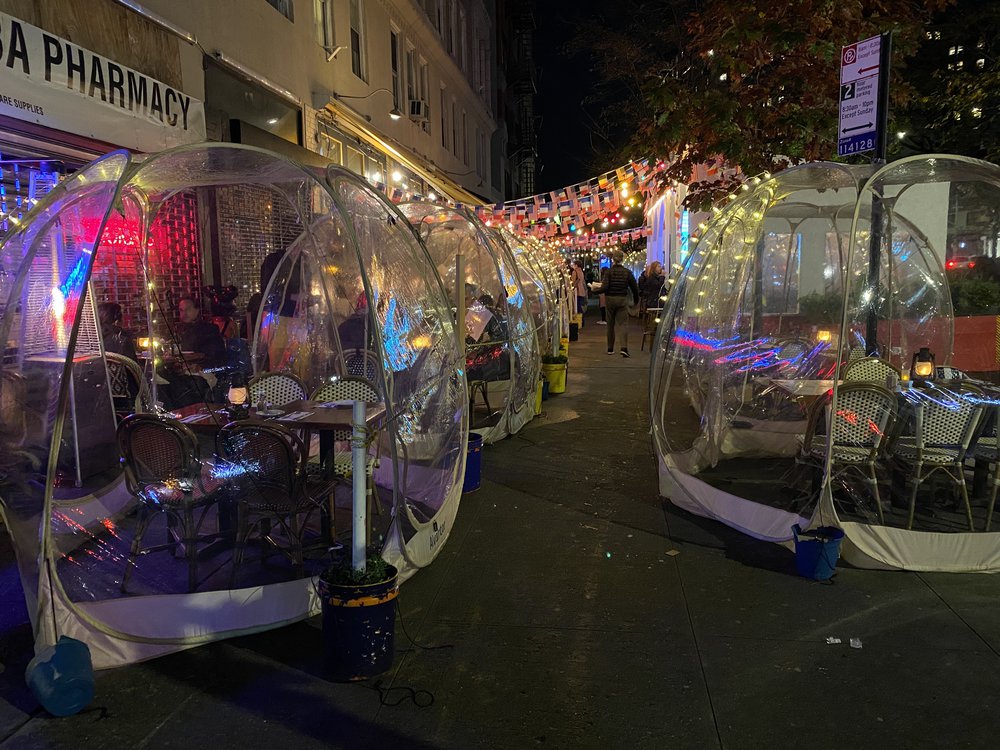Checking In: Cafe Du Soleil On How Outdoor Dining Bubbles Helped Save Their Business
Dec. 23, 2020, 12:47 p.m.
"You have to fight. Everybody's in the same ballgame. That's what I've been doing. I've been fighting since we did reopen and we've been doing okay."

Alain Chevreux has been a restaurant owner in New York City for over 30 years. In 2004, he opened Cafe Du Soleil, a French bistro in the Manhattan Valley/Morningside Heights area. During the pandemic, Chevreux came up with the idea to start seating people outdoors in plastic bubbles (one per individual group), which took off in popularity and was emulated by other restaurants around the city.
We checked in with Chevreux in mid-December, just before the city was about to endure another indoor dining shutdown, to talk about the popularity of the bubbles, the state of the restaurant industry, his fears for the winter, and how Cafe Du Soleil was able to survive 2020.
Back in March and April, when the pandemic was just starting, what was your initial reaction? In March, when it all started, I did not know what was going to happen, but around May, when you were able to do takeout and deliveries, I knew then it was going to be a long process. So sometime in July I thought about, "Okay, well now it's going to be a lengthy situation. What are we going to do?" So I tell you, one day in July, I went online and I looked for those bubbles.
What made you think of them — did you see someone else doing it? No, I didn't see anybody doing it, but I said, "Okay, what am I going to do in September when the fall comes in?" So I looked online at the time, and I jumped on one of these bubbles. That's how it happened. I said, "Well, that looks fine." And those bubbles were actually advertised for people who have a house in the country, when you can sit down and have lunch, maybe you are avoiding mosquitoes or whatever it is, right? Or when it's raining. So I said, "Let me order one of those bubbles." And it was advertised as being very easy to put together.
So I got it, and it took me about 40 seconds to put together. Same thing at night when you pack it in and bring it back in. So I ordered 16 of them originally, and I put them out in early September. It was a rare cold night in September, and I think it was raining, and I took a bubble out. And I didn't think much of it, between you and me. I said, "Oh, maybe I could make a local paper."
Somebody took a photo of those bubbles and they put them on Instagram. And I tell you, the next day, I got phone calls from everybody. NBC, CBS, ABC, Fox News, Fox Business News, Inside Edition, whatever. They all came. I never knew it was going to have such a reverberation.
Did you have any discussions with the city health department about them, did the sheriff's office come to check it out or anything? Not with those bubbles, but I got a visit from the fire department because the mayor basically told us that, "Okay, you guys are going to be able to use propane tanks." I said, "Wow, great!" I bought eight propane heaters. We had them work for a couple of days and then the fire department told us, "Hey, not so fast. You need a permit. You need somebody who is certified to use this propane tank."
So I had somebody from here who passed the test, somebody certified to use. Then they come back and say, "Hey, wait a minute. Now those heaters, they have to be minimum 10 feet from the building, five feet from any tables and chairs." And not only that, but every night, somebody would have to pick up those tanks, a professional company would have to pick up those tank because they cannot stay on premises, they cannot stay inside, they cannot stay outside. They have to be picked up and they have to be brought back the next day, seven days a week. That was costing around $400 a day to do it. So it's basically almost a month's rent just to have heaters outside. I said, "Forget about it. It's not worth it for me. I'm not going to use the type of propane heaters. It's not worth it." But sadly, I had already spent $6,000 on it.
So the heaters I see outside right now, they're not operating? You just have them out there? I cannot. As a matter of fact, the fire department asked me to remove them, even though I don't have any tanks, so I will remove them. I'm not sure if it's the law that I would have to remove them, but I don't want to go into a war. So I will remove them, but I have to have somebody, dismantle them and then pack them in, and I have to store them somewhere.

So how much have the bubbles cost you? The bubbles cost me between $350 and $400 each. I have 20 of them now.
What is your cleaning routine for them? You have two doors in them, you unzip the doors, and after each customer, we sanitize the whole bubble. We sanitize the chair, the table, or whatever has to be sanitized. And we let the air go through for a couple of minutes. And then we help the next set of customers.
Do the waiters go inside of them at all, or did they stand on the outside? No, the waiters don't go inside. Only the waiter can serve on one side or on the other side, but the waiters don't enter those bubbles. We take the order from outside the bubble. The only time that we have to go inside, per se, is to place the plates on the table.
It's very clear that this has been an incredibly difficult time for the restaurant industry in general. But when I walk by your restaurant, I always think, "Wow, this place looks busy." Do you feel like you have figured out a way to not only stay afloat, but make money during this period? Well, some days you will make money, some days you will lose money. For example, last Monday I had to close down because it was too windy and there was too much rain. If we balance out some days, we do okay. But yesterday we did terrible. So we'll never make up what we lost yesterday.
Yesterday was a particularly cold day. Right, and it was snowing during the day. So a day like today, when it's relatively nice outside, we're going to do okay. Are we going to make up for what we lost yesterday? No.
What sort of relationship do you have with your landlord? We have a very nice landlord here, and the landlord has been very lenient about the rent. And we made some type of a deal with the landlord, abut six months ago, which is ending at the end of this month. So I hope that the landlord will renew the deal. Because I can tell you one thing: January, February and March are going to be much colder than it's been so far.
And with snowstorms, with the wind factor and everything, I believe that we're going to have to close many days throughout the course of a month. That's 30 days—we may have to close at least a third of those 30 days, I'm not sure. If it gets too cold, then it's not worth it for us to be open. Nobody's going to come out anyways.

What's your feeling about the indoor dining ban? Are you worried that it could break your business? I wasn't worried about it because I've been ready for it, because we knew it was going to happen. We will continue to operate with the outside.
I do come up with gimmicks from time to time. So right now I have a special going on for delivery and takeout only, which is a dinner for two for $79. That does include an appetizer, main course, dessert for two, plus a bottle of wine. So I'm thinking about bringing this back in the restaurant. In other words right now, you basically can get this deal only for delivery and to go. I'm going to bring this back that you can come and dine and have the same deal on certain nights.
You have to be innovative. You have to be proactive in this business. You cannot say, "Oh wow, we're closing the indoor cafe now, the inside. What are we going to do now? We're going to go out of business." No. You have to fight. Everybody's in the same ballgame. That's what I've been doing. I've been fighting. I've been fighting since we did reopen and we've been doing okay. We do a lot of Instagram. We do a lot of Facebook. We are proactive in this place.
Do you feel confident that the restaurant can make it through the winter? Yes. Our best ally right now, our best partner is the weather. It's really all about the weather. I mean, are we going to make it through the winter? Yes, thank you to the landlord who has been very kind. And you see, we are a neighborhood restaurant here. Everybody knows us. We've been open for over 15 years.
So we get a lot of support from the neighbors. A lot. As a matter of fact, we feel that they go out of their way to come more than they used to come when it was not an issue with coronavirus. I think that the regulars became even more regular than they used to be before, if you understand what I'm saying.
Totally. People want to support local businesses. Absolutely. As a matter of fact, I got an email from somebody in this building. And they said, "Let us know if there is anything that we can help with. We want to support you." And we get the same vibe from so many other people. And people always congratulate us when they pass by at night saying, "You guys are doing such a good job," and everything. People are very supportive in this area.
Have you had to lay people off, or were you able to retain most of your employees? No, I did not really lay off people, but I cut their shifts. Most of the people stayed here, but some people work only one or two shifts a week. That's it. We have 20-25 employees.
Did you get any PPP (Paycheck Protection Problem, a loan given out by the government to encourage small businesses to keep workers on their payrolls)? Yes, I got the smallest amount of PPP. It didn't last through the summer. When you have to do a lot of catch-up, a lot of cleaning, it goes quick. I spent tens of thousands of dollars for the outside right there. and when you do delivery, the profit margin is much lower. I cannot sell the same product that I sell on the table when I deliver the food, really.
Do you have any idea overall how much money you have lost this year compared to last year or the year before? Well, at the very beginning we probably were down, I don't know, 50% or so. Now maybe we are down 30%, because we had a fairly good summer. But I fear that we're going to lose more again because of the weather. And no matter what in the restaurant industry, from the end of December through January, February, and March, those are always the worst months in our industry anyway. So imagine, this year is going to be even worse. So if you ask me in three months from now, I might tell you that we are back down to minus 50%. Right now we are down at about 30%, something like that, but that's now.
If the federal government had been able to pass the RESTAURANTS Act, would that have changed how you approached this year? Would you have maybe played it safe and shutdown all winter if you knew you could ride it out? No, I would stay open regardless. As long as I don't lose too much revenue, I would stay open. Doesn't make sense for me to shut down even if I get help from the government. I would definitely try to stay open.
I'm not sure what other restaurants would do though, but I think it's a little bit too late for that now because no matter what happens, some restaurants are going to shut down. We are in a different situation, we have a nice local area here. I'm talking about restaurants in areas like the Theater District. They have no tourism, they have no businesses. There is nothing left over there. Some of those restaurants are hanging on by a thread. And by shutting down the inside dining, that's going to be the end of some of those restaurants.

How do you feel in general about how the city and state have handled the pandemic in terms of the restaurant industry? Were they too harsh about shutting things down, or the right level of cautious? Well, first of all I think that they did what they had to do. Letting us sell alcohol to-go was very helpful. [Our diners] mostly drink wine, we rarely sell a cocktail or something like that. By the time you get those home, it's diluted. A bottle of wine is a bottle of wine, and that was a huge help.
It's a fact that there are over 100,000 restaurants have closed so far this year in the country, right? I said to someone recently, "If we have to close the indoor dining again in New York City...that's going to be a killer, this one." I believe that at least another 10-15% of restaurants close permanently [from that].
Basically, it's going to be very difficult for the New York City restaurant industry to come back from this one. And I'm not sure if there is a sound statistic that proves that dining inside a restaurant is more dangerous than say, taking a subway or a cab right now. If I get into a taxi, someone who was just in there before me could have had the coronavirus, right? Is there anything the taxi does for my safety? No. I would feel more safe eating in a restaurant knowing that the table is separated by at least six feet. [Note: Several studies have found that mass transit is not a major vector of COVID spread; experts have suggested that riding buses and cabs is not a major risk either.]
Well, there is no activity you do around other people that involves zero risk, especially indoors. I believe what the state said recently is that contact tracing has indicated that indoor dining has become a significant source of spread again... the CDC gave new recommendations saying indoor dining was a problem, so that is the state's perspective on it as of now. I wonder where they got those statistics. I'm not sure. I'm not sure why they say that. I would like to have proof of this. And why does the governor of New Jersey stay open? [Note: New Jersey's positivity rate is about 10%, and Governor Phil Murphy has recommended residents "Hunker down."]
I'm not sure about that, but I would imagine that what Cuomo would say is that New York City is denser and more populated than any area in New Jersey or any other area in New York. Within the restaurant, it doesn't matter. On a night like tonight, I'd be lucky if I do like 30 diners. And whoever's going to come, if they're going to come, you're going to have two people there, two people over there, two people way over there. [Note: a recent airflow study in South Korea showed spread between indoor diners sitting over 20-feet apart.]
The fact is, people who don't want to go inside the restaurant won't go inside the restaurant. There is no obligation for any customer that comes here, we don't put them inside the restaurant, they can stay outside. If they don't want to come inside, they can do whatever they want, really. So there are always a people who will not want to go inside the restaurant.
You've been here through this whole crisis. What are your feelings about New York as a city right now? Do you still love being here? Talking about here, in my area, I cannot tell you how much I appreciate the support from my neighbors. They've been really very good to us. I'm not sure about the rest of the city. Obviously the city is not what used to be. And if we continue to shut down the entertainment part of the city, which the restaurant industry is part of, it's going to take a long, long time to recover. And we may not even recover.
So there is nothing positive about what happened to us during the past six months. Nothing positive about it. There is so much, I'm not sure whether they call it "corona fatigue," but there is that. I understand that. Even me, sometime I'm tired of this. Wearing a mask, losing business, having to lay off my staff, people dying every day. It's terrible. Hopefully we are touching the end of it now. Let's see how it goes. I'm not a youngster anymore.
And I hope that the governor will rethink the situation about closing the indoor dining. I insist on that—not for me, but for the other restaurants. I think we can survive the year, as long as we have the outdoor dining and delivery and pickup, we're going to be okay. Thanks to our landlord.
This interview has been edited and condensed.